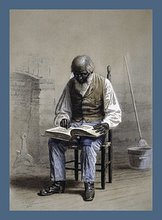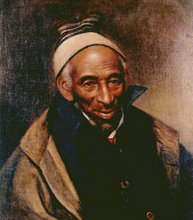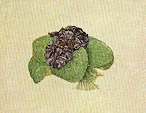The full title of Stanley M. Elkins' book, published first in 1959, is Slavery: A Problem in American Institutional and Intellectual Life. Elkins is right: Slavery was and continues to be a problem in American institutional and intellectual life. This is the great contribution of the book. The book comprises four essays: 1. an overview of the American historiography of slavery; 2. a comparison of the U.S. and South American slave systems; 3. a comparison of the African American stereotype with the personalities that emerged among survivors in German concentration camps; and 4. a critique of the Abolitionists and Transcendalists, such as William Lloyd Garrison and Ralph Waldo Emerson et al., whom he calls intellectuals without responsibility.
The book caused an uproar because of the third essay primarily and also because it was known that Elkins had been influential on Daniel P. Moynihan; castigation of Elkins for the third essay and the rejection of the Moynihan report by black civil rights leaders went hand in hand.
Elkins' comparison of the black stereotype, which he calls Sambo, with the emergent infantilism among survivors in German concentration camps comes from some kind of musings, that if Elkins had followed through with more rigor might have led to insights. However, in its raw form as presented in the book, it is just wrong, and Elkins admits this in the later essays he wrote (which appear in the edition I read). There is no reason to compare a stereotype with the documented personalities that emerged among survivors in concentration camps. The first is a stereotype and therefore reified according to the interests and prejudices of the formulators of the stereotype. There were available to Elkins at the time the writings of Ralph Ellison (named after Ralph Waldo Emerson in fact) and also of Zora Neale Hurston, among others, from which he could have attained a far more accurate view of the personalities of those Americans who emerged from slavery. The actual African American both during slavery and after slavery is far more complicated than the simple image of "Sambo" and far richer. It is unfortunate that Elkins included this half-serious comparison in his book, because the contribution of the book is his analysis not of African Americans but of white Americans and American institutions. Perhaps whites therefore were also at the time just as happy to see Elkins under fire.
In the book, The Over Slavery: Stanley Elkins' and His Critics, the most moving answer to Elkins comes from Sterling Stuckey in his "Through the Prism of Folklore: The Black Ethos in Slavery." An African American professor, now retired, Stuckey writes: "What is at issue is at issue is not whether American slavery was harmful to slaves, but whether, in their struggle to control self-lacerating tendencies, the scales were tipped toward a despair so consuming that most slaves, in time, became reduced to the level of Sambos.
"My thesis, which rests on an examination of folk songs and tales, is that slaves were able to fashion a life style and set of values--an ethos--which prevented them from being imprisoned altogether by the definitions which the larger society sought to impose." This ethos, "an amalgam of Africanisms and New World elements" helped the slaves to endure. "The process of dehumanization was not nearly as pervasive as Stanley Elkins would have us believe; that a ver large number of slaves, guided by this ethos, were able to maintain their essential humanity." After giving many examples of spirituals, Stuckey notes: "For if they did not regard themselves as the equals of whites in many ways, their folklore indicates that the generality of the slaves must have at least felt superior to whites morally. .... There is some evidence that slaves were aware of the special talent which they brought to music. Higginson has described how reluctantly they sang from hymnals--'even on Sunday'--and how 'gladly' they yielded 'to the more potent excitement of their own spirituals.'... What is of pivotal import, however, is that the esthetic realm was the one area in which slaves knew they were not inferior to whites. Small wonder that they borrowed many songs from the larger community, then quickly invested them with their own economy of statement and power of imagery rather than yield to the temptation of merely repeating what they had heard. Since they were essentially group rather than solo performances, the values inherent in and given affirmation by the music served to strengthen bondsmen in a way that solo music could not have done."
The work that remains to be done, says Stuckey, is discovering the contributions of slaves to American culture. This is what Zora Neale Hurston had tried to do. See
http://ctl.du.edu/spirituals/ for a wonderful history (with many audio clips) of the spiritual. The media clips confirms Stuckey's discussion.
Monday, March 06, 2006
Subscribe to:
Post Comments (Atom)



1 comment:
This post has been really useful for my exam revision on whether slaves were "psychologically crippled". Thanks!
Post a Comment